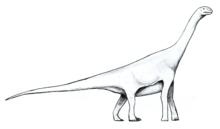Amygdalodon
| Amygdalodon Temporal range: Toarcian
~ | |
|---|---|

| |
| Restoration | |
| Scientific classification | |
| Kingdom: | Animalia |
| Phylum: | Chordata |
| Clade: | Dinosauria |
| Clade: | Saurischia |
| Clade: | †Sauropodomorpha |
| Clade: | †Sauropoda |
| Genus: | †Amygdalodon |
| Species: | †A. patagonicus
|
| Binomial name | |
| †Amygdalodon patagonicus Cabrera, 1947
| |
Amygdalodon (/əmɪɡˈdælədɒn/; "almond tooth" for its almond shaped teeth) was a genus of basal sauropod from the Middle Jurassic of Argentina. The type species is Amygdalodon patagonicus.[1] Fossils of Amygdalodon have been found in the Toarcian Cerro Carnerero Formation of the Jurassic (about 180-172 million years ago). Very little is known about it, but it is one of the few Jurassic dinosaurs from South America found thus far.
Discovery[]
The holotype (MLP 46-VIII-21-1) consists of some vertebrae, ribs, four complete and three partial teeth, and a partial pelvis and shoulder-blade, of which was discovered in 1936. The type species, Amygdalodon patagonicus, was described by Cabrera in Argentina in 1947.[1] Until 1936 sauropod fossils from Argentina were completely unknown then, prompted by Piatnitzky's brief mention of "bones of a saurian of no less than 5-7m long", Dr. Tomás Suero took a trip to Chubut to check out deposits overlying the Liassic of the Pampa de Agnia and discovered the remains of a Jurassic sauropod dinosaur around twice the size of Piatnitzky's estimation (in 1936).[2][full citation needed]
Size[]
Amygdalodon is estimated to have been 12 metres (39 ft) long and 20 metres (66 ft) tall. This quadrupedal dinosaur had an estimated weight of over 5 tonnes (4.9 long tons; 5.5 short tons).[3]
Classification[]
Rauhut (2003) placed Amygdalodon as Eusauropoda incertae sedis based on examination of the type material.[4] Later, a cladistic analysis conducted by Carballido et al. (2010) recovered the genus as a non-eusauropod sauropod.[5] Holwerda and Pol (2018) concurred, recovering Amygdalodon as sister to Isanosaurus.[6]
References[]
- ^ a b A. Cabrera. 1947. Un saurópodo nuevo del Jurásico de Patagonia. Instituto del Museo de la Universidad Nacional de La Plata, Notas del Museo de La Plata, Paleontología 12(95):1–17
- ^ Piatnitzky, 1936
- ^ Paul, G.S., 2010, The Princeton Field Guide to Dinosaurs, Princeton University Press p. 176
- ^ Rauhut OWM. Revision of Amygdalodon patagonicus Cabrera, 1947 (Dinosauria, Sauropoda). Mitteilungen aus dem Museum für Naturkunde in Berlin, Geowissenschaftliche Reihe. 2003;6:173–181.
- ^ José Luis Carballido and Diego Pol (2010) "The dentition of Amygdalodon patagonicus (Dinosauria: Sauropoda) and the dental evolution in basal sauropods." Comptes Rendus Palevol 9: 83–93.
- ^ Femke M. Holwerda & Diego Pol (2018). Phylogenetic analysis of Gondwanan basal eusauropods from the Early-Middle Jurassic of Patagonia, Argentina. Spanish Journal of Palaeontology 33(2): 289-298. DOI: 10.7203/sjp.33.2.13604 https://www.researchgate.net/publication/330520139_Phylogenetic_analysis_of_Gondwanan_basal_eusauropods_from_the_Early Middle_Jurassic_of_Patagonia_Argentina
External links[]
- Sauropods
- Dinosaur genera
- Toarcian life
- Middle Jurassic dinosaurs of South America
- Jurassic Argentina
- Fossils of Argentina
- Golfo San Jorge Basin
- Fossil taxa described in 1947
- Taxa named by Ángel Cabrera












